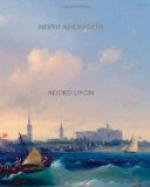“Whatsoever a man soweth, that shall he also reap. For he that soweth to his flesh shall of the flesh reap corruption; but he that soweth to the Spirit shall of the Spirit reap life everlasting.”—Gal. 6:7, 8.
In the spirit world are Rupert, Signe, Henrik, Marie, Rachel and all our friends in their time and place. These are employed in joyous activity, as they see their field of usefulness continually widen. Rupert had done a great work before the others had come. He had preached the gospel to many people, mostly his ancestors, among whom there had been at the time of his arrival among them an awakening and a desire for the truth. He had traced his family back to those who on earth had been known as the Pilgrim Fathers, thence through many generations to the Norsemen of northern Europe. His wife’s family he had also searched out, and he had discovered, greatly to his delight, that her family and his met in a sturdy, somewhat fierce, Viking chief. Rupert had sought him out, and had told him of Christ and His gospel—and the Viking had been willing to be taught. When Signe had come, Rupert had brought her to visit her many-times-great-grandmother, who was a beautiful flaxen-haired, blue-eyed woman, whom Signe herself somewhat resembled.
Then when Rupert met and became acquainted with Henrik, Marie, and Rachel, he told them of what he had done, and how that their vicarious work for the dead had fitted so nicely in with his preaching, in that many of those for whom they had been baptized were those whom he had converted. “We have been working in harmony and in conjunction,” exclaimed Rupert, “and God’s providence is even now clearly justified.” What joy was there when Henrik and his friends met those for whom they had performed the necessary earthly rites! Many of these had long ago believed the gospel, and their hearts had been turned to their children—their descendants living on the earth—that they would remember their fathers who had gone before; and these were overjoyed when they met their “saviors,” as they called them. Then, there were others who had not accepted the work done for them, and these were, naturally, not so enthusiastic in their greetings. Others there were who were yet in ignorance of Christ, of His plan of salvation, and the work that had been done for them. These would have to be taught and given a chance to accept or reject what had been done.
“You enjoy a happiness that does not come to me,” said a brother to Henrik, “in that you receive the love and joyous greetings of those for whom you did work in mortality.”
“Had you no opportunity to do such work?” asked Henrik.
“Yes; but I had no names of ancestry, and the truth is, I did not try to get any.”
“You did not do all in your power?”
“No; I was careless in the matter.”
“If you had only tried, the way would have been opened. That is a true principle. We do not know what regions of usefulness lie before us if we do no exploring.”




